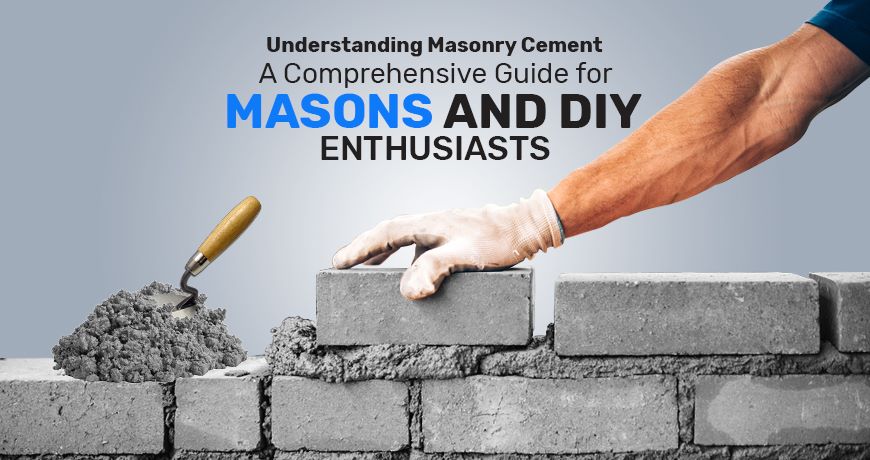Welcome to our comprehensive guide on understanding masonry cement, created specifically for masons and DIY enthusiasts alike. Whether you’re a seasoned professional or a passionate do-it-yourselfer, having a solid grasp of masonry cement is essential for successful construction projects.
In this article titled “Understanding Masonry Cement: A Comprehensive Guide for Masons and DIY Enthusiasts,” FixDar will delve into the ins and outs of this crucial material used in various construction applications. From its composition and properties to its role in enhancing bond strength between masonry units, we’ll cover it all.
Whether you’re working on brickwork, stone walls, or any other type of masonry project, understanding the intricacies of masonry is key to achieving durable and visually appealing results. So let’s dive into this comprehensive guide and expand your knowledge on all things related to masonry cement!
Discover the artistry of masonry with FixDar. Transforming spaces through impeccable brickwork, stonework & concrete solutions. Elevate aesthetics and durability in every project. Your vision, our craftsmanship.
What is Masonry Cement?
Masonry cement is a specialized type of cement specifically designed for use in various masonry applications. It is formulated by blending portland cement, finely ground clinker, limestone, and other additives to create a durable and workable mortar mixture. This mortar serves as the binding agent for bricks, blocks, stones, or other materials used in constructing walls, foundations, chimneys, and more.
For professional masons or DIY enthusiasts alike, having access to high-quality masonry cement is essential for achieving strong structures that withstand the test of time. With the right combination of strength and workability provided by this versatile material, masons can create solid bonds between different components while ensuring structural integrity.
By utilizing proper techniques with quality products like masonry, masons can achieve precise results during bricklaying or stonework projects. Whether you’re repairing existing structures or building new ones from scratch, mastery over using masonry tools combined with an understanding of masonry cements will enable you to excel in your craft.
The Composition and Characteristics of Masonry Cement
Masonry cement is a vital component in the construction industry, particularly for masons who work with various tools and materials to build sturdy structures. Understanding its composition and characteristics is essential for achieving durable and aesthetically pleasing results.
Masonry cement is specifically formulated to bond different masonry units such as bricks, stones, or concrete blocks together. It consists of a mixture of Portland cement, limestone, and other additives that enhance workability and strength.
When it comes to masonry tools and techniques used by skilled masons, having the right type of cement is crucial. Masonry cement offers excellent adhesion properties, ensuring secure bonds between individual units while withstanding external forces like wind or seismic activity.
Furthermore, this type of cement exhibits high durability against moisture penetration and weathering effects. This characteristic makes it ideal for outdoor applications where structures are exposed to harsh elements.
Key Applications of Masonry Cement in Construction
Masonry cement is a versatile material that finds key applications in various construction projects. Masonry tools, such as trowels and bricklaying equipment, are essential for masons working with this specialized cement. Let’s explore the most relevant keywords related to masonry tools and their connection to the application of masonry.
When it comes to constructing structures like walls, chimneys, or fireplaces, masons rely on their expertise and a range of specialized masonry tools. These include trowels for spreading and leveling mortar, brick hammers for cutting bricks to size, jointers for creating uniform joints between bricks or blocks, and many more.
Masonry cement serves as the binding agent that holds together these building elements. It is specifically formulated with additives to enhance its workability, durability, and bond strength when used with different types of masonry units.
From residential buildings to commercial complexes and even historical restoration projects, the applications of masonry guided by skilled craftsmen (masons) are vast. The combination of quality materials like masonry cement along with precise techniques ensures sturdy structures built to withstand weather conditions while providing aesthetic appeal.
Tips for Achieving Stronger Bonds and Professional-Quality Results
When it comes to masonry work, achieving stronger bonds and professional-quality results requires not only skill but also the right tools. Masonry tools are essential for any mason or DIY enthusiast looking to create durable structures with precision and accuracy.
One crucial tip is to invest in high-quality masonry tools that are specifically designed for the task at hand. Keywords like “masonry tools” or “mason” are highly relevant in this context. Tools such as trowels, chisels, levels, and jointers should be of superior craftsmanship to ensure optimal performance.
Additionally, proper technique plays a significant role in achieving strong bonds and professional-grade outcomes. Moreover, ensuring adequate preparation before starting any masonry project is vital.
By following these tips and utilizing appropriate masonry tools effectively as a skilled craftsman or enthusiast would do; you’ll be well on your way to creating sturdy structures with impressive aesthetics!






